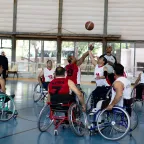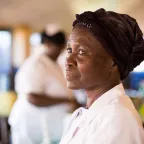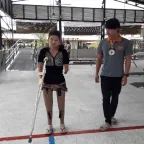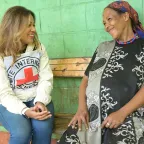How wheelchair basketball supports social inclusion in Syria
Jess Markt, also fondly known as Captain Jess, spent a week in Syria training coaches, referees, classifiers and players from the six governorates of Damascus, Homs, Aleppo, Tartus, …
Jess Markt, also fondly known as Captain Jess, spent a week in Syria training coaches, referees, classifiers and players from the six governorates of Damascus, Homs, Aleppo, Tartus, …

A man storms into the operating theatre. He is angry and carrying a gun. His wife just died while giving birth despite all efforts by the doctors to save her. He raises his weapon and starts …

… Through a programme that also creates jobs and clears the region of landmines, the …

Most of ICRC missions are in remote locations, and any inability to be posted in remote areas will de facto preclude obtaining of a medical clearance. All new employees to the ICRC must submit to a …
… gave her much happiness. Her sons took on odd jobs, while she sewed clothes for her …

… for women? A: For years, women had very few jobs to choose from. Though many more are now …

The conflict in Oromia has deeply affected communities’ daily lives, particularly in the western part of the region, not far from the borders with Sudan and South Sudan. Arpita Mitra, an ICRC …

… as teachers and health workers who do their jobs in the midst of hostilities. We call on …

Post-traumatic stress, insomnia, becoming withdrawn and irritable … For people who have witnessed violence, there are the hidden wounds that have a serious impact on their lives – and civilians in …

ITC and the International Committee of the Red Cross sign Letter of Intent to expand collaboration in humanitarian and development nexus. (Geneva) The International Trade Centre (ITC) and the …
Try one of the following resources:
Created in 1863, the ICRC library, alongside the ICRC archives, provides an indispensable documentary reference on the organization itself and international humanitarian law.
International humanitarian law is based on a number of treaties, in particular the Geneva Conventions of 1949 and their Additional Protocols, and a series of other instruments.
Customary international humanitarian law consists of rules that come from "a general practice accepted as law" and that exist independent of treaty law.